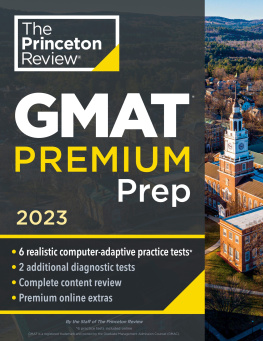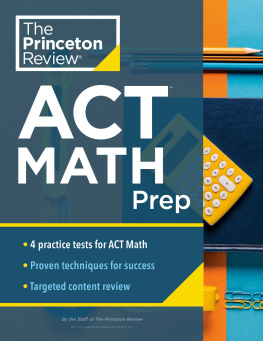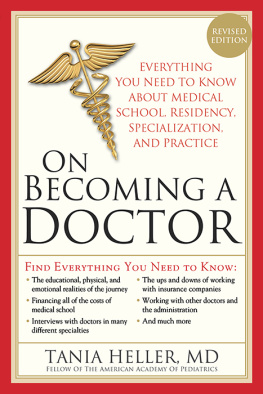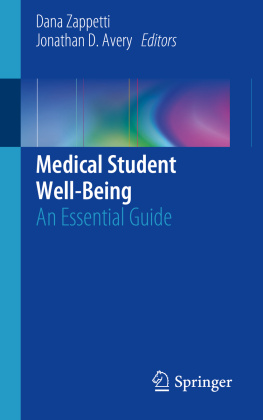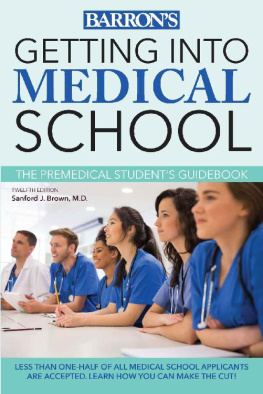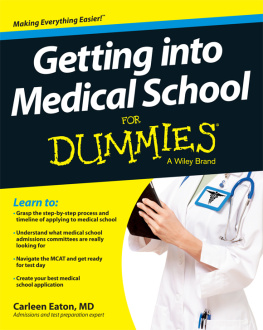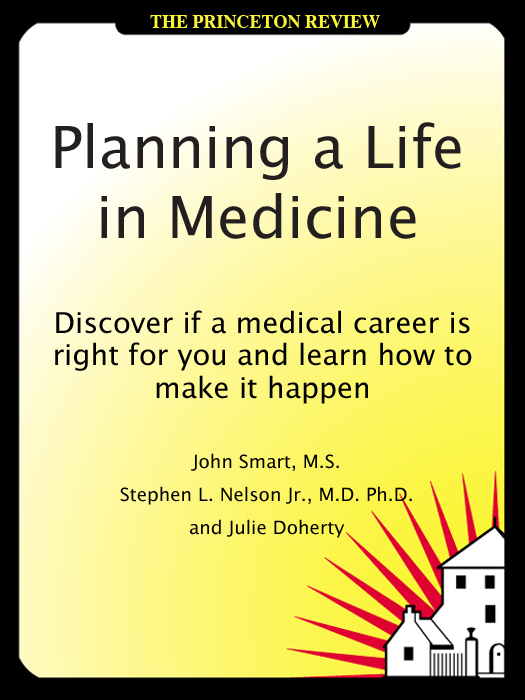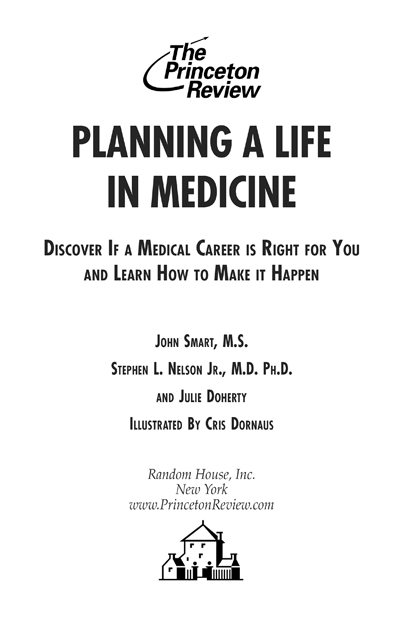Princeton Review Publishing, L.L.C.
2315 Broadway
New York, NY 10024
E-mail:
2005 by Princeton Review Publishing, L.L.C.
The Princeton Review is not affiliated with Princeton University.
All rights reserved under International and Pan-American Copyright Conventions. Published in the United States by Random House, Inc., New York, and simultaneously in Canada by Random House of Canada Limited, Toronto.
eISBN: 978-0-307-94500-6
Editorial Director: Robert Franek
Production Editor: Christine LaRubio
Production Manager: Scott Harris
Editor: Erik Olson
v3.1
This book is dedicated to my best friend and inspiration,
Beatrice Lyyli Smart, my mother.
J.S.
CONTENTS
I NTRODUCTION
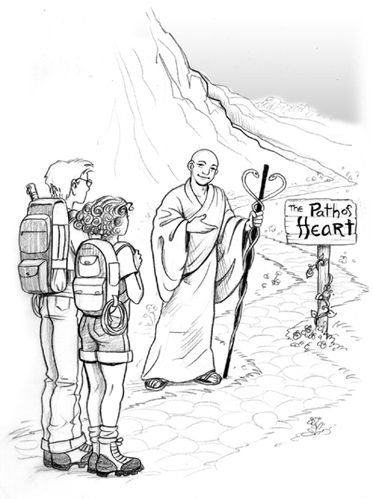
THE PATH OF HEART
Life is a journey, not a destination. You can choose a worthy and challenging goal, but real life happens to you in the long stretches of living between the realization of your noble plans; it happens in the hourly effort you make, the daily direction you take, and how you treat yourself and others in the process. Troy Gardner, a philosopher and friend of mine, likes to say: How you live your seconds, is how you live your days, is how you live your life. That about sums it up.
If you believe your path is in medicine, you are committing to a lifelong climb. The ascent into the field is steep and demanding, requiring spirit, motivation, commitment, and a lot of stamina. Once youve made it through the first gate, youll find another always ahead. Arrival at full medical practice requires at least a ten-year journey from the beginning of your premedical years. Yet the most significant thing about that destination: it marks a new beginning in your journey. You will face a long tradition of rules and proper conduct, one that pushes you to think of and act with great responsibility for the well-being of others. The medical terrain is often rocky and constantly changing, requiring you to be open-minded, confident, and talented in a number of areas.
But what heights you will reach! Your ability to help other human beings, to deeply impact their lives, will grow powerfully on your journey, both as your experience grows and as awesome and surprising new scientific advances move from the lab to the bedside at ever higher rates each year for the rest of your life. You will see a constantly expanding and partly unmapped future ahead, shaped by avalanches of new medical information that you will carefully navigate, for the benefit of the growing number of people who depend on you.
During your premedical education and initial medical training over the next ten years, you will be challenged ethically, emotionally, intellectually, and physically. You will have to work hard, think quickly, plan ahead, use skills and reasoning, and sometimes, make miracles happen. And yet, when they come, these miracles are at the heart of everything you will do as a doctor. Every year, medicine develops increasingly powerful therapies and treatments. As a physician, you will have the opportunity to deeply touch and, at times, save the lives of your patients. You will be an intimate part of many difficult, wonderful, and life-changing experiences. You will see children being born, a heart beating inside of a living body, people living with terminal illnesses, and people dying. Are you ready to take this journey? Is there a place for you in medicine? As Dr. Steve Nelson says, you must accept that you will never reach a point where your medical training ends, where you can say that you made it. Medical school is not about making you a doctor as much as it is about developing lifelong habits of learning and hard work, which are much more important at the start of internship than any knowledge you learned from a book. Medical school is the start of a wonderful, rewarding, lifelong journey that will consume your life, demand your passion, make you want to quit at times, expose you to both the wonders and horrors that all people are capable of, and if you are willing, it will give you a greater purpose than any other occupation ever could.
Becoming a physician is, in many ways, the ultimate professional challenge in our society. By choosing to be a premedical student, you are entering the realm of the most demanding, life-changing, and for many, inspiring profession on the planet. So you are wise to approach this challenge by reading this bookit shows thoughtfulness and foresight on your part. The good news is that it is not a challenge reserved only for natural climbers, and it is not a solo effort. There will be guides and coaches aplenty who will make your life tremendously easier if you allow them to do so. Becoming a physician is about learning the skills and scaling the peaks necessary to climb with the team. If you love science and medicine, enjoy working with people, can humbly take direction and correction, and are capable of planning ahead, you can become a doctor. The most important thing is that you be willing to persist in finding your place over the long term.
You must be willing to reflect, work hard, make plans and back-up plans, and apply to medical school more than once, if necessary. You will face several years of difficult preparation to get through the first big gate, your acceptance to medical school. But if you have persistence, confidence in yourself, and the abilities listed above, you will eventually succeed. We have written this book not only to aid your success, but also to help you find a path to medical success that you love, one that you are happy to walk every day, one that has the kind of ideals you aspire to embody. Not simply a path, but your path of heart.
The path of heart is the path that will excite, ennoble, and inspire you throughout your lifetime. Students on this path are both passionate and aware of how little they really know in the great field of medicine. They arent solely focused on being accepted to medical school. Instead, they maintain perspective and balance while approaching the many challenges that must be overcome on the way to becoming a doctor. They delight in learning and persist in studying, even when the path grows steep. They take the time to form relationships with other people in the field and to strengthen their friendships, though they may have to make sacrifices to do so, and they choose quality over quantity, particularly in the early years of their training. If it takes more than one admission cycle to get into medical school, they arent distraught. They stay on the path, continuing to do the little things every day of their journey that will make them a better candidate and ultimately, a better physician.
The alternative to following the path of heart is to take shortcuts, to cheat, to give only the minimum necessary requirements, to lose your perspective and your spirit, to take on more than you can capably do, to succumb to excessive perfectionism and constant stress. The result will be disappointment, self-abuse, cynicism, negativity, or depression. Without a deep desire to do what you are doing and the respect for yourself to do it with dignity, feeling, and honor, it will be difficult to succeed in the long years ahead. Those who manage to simply muscle, luck, or cheat their way into medical school (and there indeed are some who do every year) end up bummed out in wonderland, unable to enjoy the amazing opportunity they have been given.




